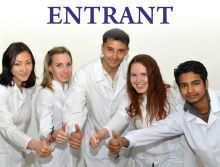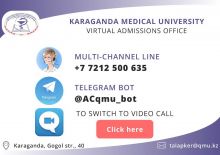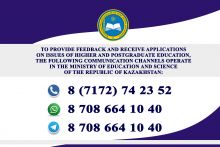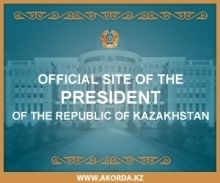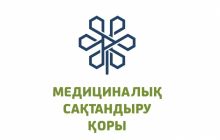History of the university
The history of the Medical University since its inception is the path of
becoming a professional leader not just in the field of medicine, but higher
education in general. The history of the Medical University of Karaganda is a
mirror of the history of the country, formation of health care throughout
Kazakhstan.
The development of the medical education system in our country began in 1931 with the foundation of a medical university in Alma-Ata. However, the institute was soon unable to meet the growing need of the republic for medical personnel. In this connection, the question of the need to open a medical institute in Karaganda city, which in 1940 became a regional center with a population of more than 196 thousand people, was raised before the republican bodies and the People's Commissariat of Health of the USSR. But the Great Patriotic War changed plans, and the question of creating The Karaganda Medical Institute returned only in 1947, when the Regional Department of Health of Karaganda made a proposal to the Ministry of Health of the Soviet Union to open a university in the mining capital. The decree of the Council of Ministers of the USSR of November 16, 1947 obliged to transfer to Karaganda "one of the existing medical institutes." In December 5, 1949, the order of the Chairman of the Council of Ministers of the USSR was issued with the instruction “to oblige the Council of Ministers of the RSFSR and the Ministry of Health of the USSR to transfer, in the prescribed manner, from the liquidated Kazan Dental Institute to the Karaganda Medical Institute, professors, teachers, as well as students who completed their first year. The director of the institute was appointed a physician -Peter Moiseevich Pospelov.
By the assignment of the USSR People's Commissariat of Health Peter Moiseevich arrived in Karaganda from Stavropol Territory where he was born, studied and started his working career. Karaganda was the place of development of Peter Moiseevich as a doctor, teacher and organizer of a public health. P.M. Pospelov started his medical practice in the hospital as the head of therapy department, and then as the hospital chief officer. In September 1939, Peter Moiseevich was appointed to the position of deputy head of the Karaganda regional health department. Since April 1940 , Pospelov was confirmed in office of the head of Karaganda regional health department. According to the Order of the Health Ministry of the Kazakh SSR Peter Pospelov Moiseich was appointed to the position of director of the Karaganda medical institute (KMI) in April 1950. Between 1950 and 1974 under the guidance of Peter Moiseevich there was a time of establishment and development of the institute.
Higher-education teaching staff of the KMI included specialists arrived from Kazan to Karaganda: a professor -Abram Iosifovich Labbok, a candidate of historical sciences - Mariya Mihailovna Lonyshakova, a candidate of biological sciences - Angelina Arcadievna Zorina, a biologist - Modest Evgenievich Afanasyev, a biochemist- Valentina Iosifovna Yakubovskaya, a candidate of medicine and physiologist -Anvar Arslanovich Uzbekov, a senior professor -Boris Grigorievich Mokeev, professors-dentists- Vera Stepanovna and Valeryan Aleksandrovich Lavrovy, a teacher-anatomist -Galiya Gareevna Shamseeva, a chemist -Boris Grigorievich Mokeev, an infectious diseases doctor -Abraam Yakovlevich Shulgin, a microbiologist -Grigoriy Iosifovich Mar, an obstetrician-gynecologist -Isaak Iosifovich Kaganovich, surgeons -Dina Lazarevna Zirlina, Mark Grigorievich Shraiber, Grigoriy Yakovlevich Hvoles, a therapeutist --Evgeniy Israilevich Zukerstein, a physical-education teacher -Evgeniy Petrovich Shepelev.
On September 1, 1950 Karaganda medical institute opened its doors for the first students: 127 of the first course students and 101 students of the second one, 69 of which came from Kazan. 11 departments of the only medical faculty were opened. In 1950 there were only 23 teachers, including 3 doctors and 3 candidates of sciences in the university. The first science achievement of KMI was carrying out of the scientific student conference which was held on November 21, 1950. The postgraduate residency was opened in 1952. In 1955, Karaganda medical institute finished the implementation of the six-year education program and there were the first graduates - 94 doctors, including 15 people with the highest distinction. In 1957, the institute received a priority of the defense of a thesis at the Academic board. Peter Moiseevich Pospelov was appointed to the position of Chairman of the Academic board. The first were assistants N.K. Popova and G.G. Shamseeva who defended the theses in candidacy for a degree in medicine on April 24, 1958.
A difficult period of the university establishment ended with the first graduation of medical students and priority of the defense of a thesis. The 60s were the period of strong growth and development for the Karaganda medical institute. The list of scientific specialties was approved in 1967: obstetrics and gynecology, human anatomy, internal diseases, pathological physiology, surgery and biological chemistry according to which the Academic board of KMI was allowed to accept the defense of theses and award the degree of candidate of medical sciences. At the meetings of the Academic board of KMI the theses were defended by the institute members as well as by candidates from other republics of the USSR, which indicates a high level of scientific capability of the Karaganda medical institute among the educational institutions of the Soviet Union. Thus, among the people who defended theses in the 60s at KMI were representatives of the medical institutions of Almaty, Semipalatinsk, Tashkent, Andijan and Moscow. At the Academic board of KMI from 1958 to 1972 there were 186 defenses of theses in candidacy for a degree of medical sciences and 23 defenses in candidacy for the degree of Doctor of Medical Sciences.
In 1961 , the institute was awarded the first category and a year later the pediatric faculty was opened. Industrial enterprises, organization of the construction industry, garment manufacturers, food processors and other industries, sanitary and epidemiological city stations allocated infrastructure for the educational process and practical training to the students of the sanitary and hygienic faculty. The all Karaganda hospitals allowed students of medical and pediatric departments to gain the clinical skills. The level of scientific research conducted at the institute confirms the participation of the key KMI scientists in international scientific congresses. On November 27, 1965 ,Karaganda medical institute received a telegram to the head of the psychiatry department and professor Abram Moiseevich Svyadosch with an invitation to participate in the III International Congress of Psychosomatic Medicine which was held in Paris on September 15-18, 1966. In the request of the university administration to the external relations board there was pointed that "a professor A.M. Svyadosch is fluent in French, German and English, and his book "Neuroses and its treatment" is widely known abroad".
In 1966, the Central Research Laboratory was opened in the university and it was headed by the candidate of medical sciences Madeniat Madievich Sarsembayev. It was Madeniat Madievich who organized the Junior Academy of Sciences for pupils in the Palace of Children and Youth and has been its rector for a long time.
Along with the university the student’s research work was developing.
Thus, in KSMI there was the first republican scientific student conference with reports in foreign languages in 1964. A big event in the life of the institute was the carrying out of the first All-union student conference among the students of medical universities with reports in foreign languages in 1968. At this conference Scientific Society of KSMI presented 25 reports. At the conference there were listened 182 reports in English, German, French and Japanese. To the order of the Ministry of Health of the USSR the best 16 reporters were awarded a commendation.
It should be noted that to the early 70s the higher-education teaching staff of the Karaganda medical institute included a highly qualified scientific and pedagogical staff with academic degrees at a level exceeding mid-point among of the Union.
In 1974, a candidate of medical sciences and the associate professor Alexander Petrovich Filin was appointed to the position of rector of KSMI, who guided the institute activity for 10 years. This period was marked by the opening of new departments. A.P. Filin was initiator of research work on a contractual basis, thereby research sector (RS) created in 1974 gained fame 2 years later as a reliable partner and a highly skilled executive of registered scientific and practical subjects. A dental faculty was opened in 1978. An associate professor Galim Tajibaevich Eslyamgaliev was the first dean of the dental faculty.
From 1984 to 1989 the head of the institute was a Doctor of Medical Sciences and professor Nikolai Arkhipovich Hlopov. The faculty of preparing nurses was organized during this period, and the first head was a candidate of medical sciences and assistant professor Mikhail Yakovlevich Falikovich. The institute continued to work keeping traditions established by its founder, opened new departments and the great attention was paid to the research work.
For the successes achieved in the All-Union socialist competition among medical and pharmaceutical universities, institutes for advanced training for doctors in 1985 and the 11th five-year plan in general, the Karaganda State Medical Institute was awarded the second place among medical universities of the USSR with the award of a Diploma of the Ministry of Health of the USSR and the Central Committee of the Trade Union of Medical Workers and a cash prize.
From 1989 through 2001 the rector of the institute was an academic of RK NAS, a Doctor of Medical Sciences and professor Makash Tinishtikbaevich Aliyakparov. In 1990, department with Kazakh language of education was opened and the great opportunity to get the education on state language appeared. The head of the department was a candidate of medical sciences and associate professor Erkebulan Tuleubaevich Tuleubaev. The scientific research center was established in 1991. The first director was a Doctor of Medical Sciences and professor Ermek Nigmetovich Sraubaev. At that time the preparatory department for foreign students began to work and it was headed by a candidate of medical sciences and associate professor Evgeniy Vladimirovich Pukhov. In this year there was opened a faculty of general medicine as a main stage of theoretical preparation of students of general medicine, pediatrics and sanitary and hygienic departments. A candidate of medical sciences and associate professor Auezkhan Omarkhanovich Omarkhanov was appointed to the position of the dean of general medicine department. The medical and biologic faculty which was headed by Doctor of Medical Sciences and Professor Sergey Petrovich Terekhin was opened in 1992.
In this year a computer information center started to work on the basis of department of software and hardware education facilities that enabled to computerize the educational process. The first director of the center was Anuar Shaimerdenovich Baigulov. The department of doctors and nurses’ skills upgrading was opened at the institute in 1993 and it was headed by the Doctor of Medicine Sciences and professor - Aleksander Georgievich Shvetsov.
According to the Government Resolution of the Republic of Kazakhstan from the 25th of February, 1997, Karaganda state medical institute was changed to Karaganda state medical academy. The international cooperation division for the foreign students’ education was opened on the basis of the deanery of foreign citizens in 1999. The head of the department was a candidate of medical sciences and associate professor Aleksander Mihailovich Filatov. During the guidance of M.T. Aliyakparov a new conception of medical education was realized: multi-staged, modular and rating education and control system according to the teaching materials.
From 2001 till 2009, Karaganda state medical academy was headed by an academician of NAS of RK, doctor of medicine and professor Ilyas Rayhanovich Kulmagambetov. This period was marked by the opening of the English department for foreign students in 2001 which has greatly facilitated access to foreign citizens training in the academy. Time required new qualifications from future medical professionals and in this regard in 2002 the departments of pharmacy, oriental medicine and also the medical college were opened. The qualitative training of the teaching staff continued to improve. In 2002 at Karaganda state medical academy there was an approving of Dissertation council which accepted to the defense of a thesis for the degree of doctor of medical sciences in "Internal diseases" and "Pharmacology, clinical pharmacology for medical sciences". During the period of Dissertation council functioning (2002-2011) there were defended 15 theses for the degree of doctor of sciences and 75 theses for the degree of candidate of sciences. The chairman of the Dissertation council was an academician of NAS of RK MD and professor Ilyas Rayhanovich Kulmagambetov.
Since 2002 Karaganda state medical university participates in the implementation of international scientific research and development in collaboration with the state research center of virology and biotechnology "Vector" MoH of Russian federation (Novosibirsk ) and the cancer research center of RAMS (Moscow). Also KSMU participated in two projects under the republican NTP "Development and manufacturing application of herbal medicinal products for the development of pharmaceutical Kazakhstan industry" (2002-2006) with the Institute of phytochemistry of MES of RK. In 2007 ,the professors Kani Zhumkenovich Musulmanbekov and Valentina Bronislavovna Sirota were awarded the State prize in science and technology of the RK according to the results of scientific research in the development of drug products for the cancer treatment.
During the period of 2002-2003, the medical academy participated in international conferences under cooperation with the World Health Organization "The rational use of drug products" and the 7th Regional meeting on the reform and development of pharmaceutical education of the Central Asian Republics".
In 2002 the institute received a license for medical practice. There was an opening of the dental clinic which was organized by the candidate of medical sciences and dentist of higher category- Kanat Madievich Smagulov. In the same year students had an opportunity to make medical care in the student clinic. Also the first in the Republic of Kazakhstan teaching and clinical laboratory of the institute began operating in 2002.
Scientific and pedagogical experiment (NPE) on the introduction of credit technology of education in medical education was carried out for 5 years at the Academy in accordance with the Order of the Ministry of Education and Science of the Republic of Kazakhstan No. 812 of November 12, 2002 "On the conduct of the Karaganda State Medical Academy of a scientific and pedagogical experiment to develop a conceptual approach for adapting state standards of medical education to the international educational space". The results of this program were used in the development process of new state compulsory education standard on medical specialties of 2006, in instruction letter №6, in standard education program for medical specialties of 2006, in comparative analysis of student performance according to the SPE and the traditional form of education. The activity of KSMA and provided educational services were highlighted and presented at the international exhibition of higher education institutions “Education India 2002” which took place in New Delhi.
The public association "An independent labor union of employees and students of KSMU" was established in the Karaganda state medical academy in 2003.
The university was the first in the CIS which was certified for quality management system by the authorized body NQA-UK, NQA-Russia. KSMA took part in the national and international meetings in the framework of the strategic partnership of WHO / WFME for improving the quality of medical and pharmaceutical education (2003, 2005, 2006, 2007).
Within the implementation of the Concept reforming the medical and pharmaceutical education in the Republic of Kazakhstan (2006-2010) in the academy there was founded educational and clinical (simulation) center in 2007, which was headed by the candidate of medical sciences Viktor Petrovich Riklefs. All premises of the educational and monitoring center with the total area of 809.2 m2 are equipped with appropriate simulators, manikins, medical equipment and instruments, audio-video and computer equipment. In this year the Centre for medical education of KSMA was established and headed by the doctor of medical sciences Farida Nusupzhanovna Nurmanbetova. The Centre concerned international cooperation in the field of medical education and introduction of new learning technologies in the educational process. The following specialties "General medicine", "Public health" were opened in the institute in 2007, "Nursing" – in 2008.
In 2007 KSMA for the first time conducted the research in the field of medical education within the scientific and technical program "Scientific implementation of the Concept reforming the medical and pharmaceutical education in the Republic of Kazakhstan (2007-2009)". At the same time the institute for the first time took part in the rating of universities of Ministry of Education and Science of the RK and ranked first among medical institutions of the country.
Karaganda state medical academy entered the TOP-50 and took the 8th place among the best universities in Kazakhstan in 2008 in the rating of the Ministry of Education and Science of the RK. In the same year the academy signed Taraz declaration is a memorandum of universities of Kazakhstan. In this time period KSMA was included in the list of medical schools top-ranked by Medical council of India which graduates are permitted passing the qualification exams in India.
From 2009 till August 2011, Karaganda state medical university was headed by the Doctor of Medical Sciences and professor Murat Koyshibaevich Teleuov. In 2009, within the Concept of reforming the medical and pharmaceutical education in the RK according to the Government Resolution dated the 19th of February 2009, №188 RSE (Republic state enterprise) "Karaganda state medical academy" was renamed as RSE "Karaganda state medical university." In the same year the university got the right to carry out educational activities for master's degree programs in the following specialties: "Medicine", "Public health", "Medical and preventive work", "Nursing" and residency in 9 specialties.
On September 17, 2010 within the integration into the European educational space in the context of the Bologna Process KSMU signed the Great University Charter in Bologna (Italy). The scope of competence of the graduate and professor of KSMU was developed and approved for the introduction of competence-based approach to the educational process. In 2010, the university clinics (dental clinic and polyclinic) were accredited against the health subject activity to the accreditation standards in the field of health of the Republic of Kazakhstan.
In 2010, Karaganda state medical university was recognized as the best medical higher education institution in Kazakhstan according to the rating of Independent Kazakhstan Quality Assurance Agency in Education (IQAA), at the same time the institution successfully passed institutional accreditation.
Since August, 2011 KSMU is headed by the doctor of medical sciences and professor Raushan Sultanovna Dosmagambetova. In 2011, Karaganda state medical university was ranked first among the universities of Kazakhstan according to the results of the intermediate state control. In the same year the university was accredited for scientific and / or technical and scientific activities, and in 2012 there was a state attestation. As a recognition of the high quality of the doctors training was the university inclusion in the directory of medical schools "Avicenna" by World Health Organization (World Directory of Medical Schools, WHO) in 2011.
The internal and external academic mobility of teaching staff and students (students, undergraduates and PhD students) is actively developing in the university since 2011. In 2012 KSMU got right to carry out educational activities for PhD doctoral programs in the field of "Medicine", "Public health" and "Pharmacy".
Since April 2012, the Supervisory Board has been operating in KSMU, which worked out proposals on the priority areas of KSMU's activities, gave an opinion to the authorized body on the draft university development plan, on making changes and additions to the plan, and participates in the development of a collective agreement. As a result, this makes it possible to improve the structure of the university, social support of the teaching staff, personnel, and students, to strengthen the material and technical base. From April 2012 to March 2013, Murat Koishibaevich Teleuov, Director of the Department of Science and Human Resources of the Ministry of Health of the Republic of Kazakhstan was the Chairman of the Supervisory Board. Later, the Supervisory Board was headed by Alma Alibekovna Syzdykova - Director of the Department of Science and Human Resources of the Ministry of Health of the Republic of Kazakhstan.
Since 2012, on the initiative of the university, the Central Asian International Conference on Medical Education has been held. Since 2013, KSMU has participated in the implementation of projects under the European Union TEMPUS IV program: Central Asian Network for Education, Research, and Innovation in the Field of Environmental Health; creation of an interregional network of National Centers for Medical Education aimed at introducing problem-based education and virtual patients; promoting the development of educational organizations through the development of people.
KSMU has implemented a multilevel structure of continuous training of medical personnel. It included a medical college for training mid-level health workers, as well as a faculty of continuing professional development, where more than three thousand doctors improved their professional level annually. The university introduced a credit technology of education and a three-stage training model: bachelor - master - doctor РhD.
In 2013, new bachelor's specialties "Biology" and "Technology of pharmaceutical production" were opened. Training of scientific and pedagogical personnel at KSMU was carried out within the framework of the magistracy and doctoral PhD in the specialties "Medicine", "Public health", "Nursing", "Pharmacy", "Technology of pharmaceutical production", "Medical and preventive business".
The faculty of the university introduced new advanced technologies for teaching and monitoring students' knowledge, simulation technologies, and improved the material and technical base of the departments of the university. More than eight thousand students were taught in the state, Russian and English languages. 70 professors and Doctor of Sciences, 251 associate professors, candidates of sciences and PhDs, 68 undergraduates taught at the university. The infrastructure of the university made it possible to obtain conditions for education in accordance with the most modern requirements and conduct scientific research and includes five educational buildings with classrooms equipped with interactive equipment, a scientific library with reading and multimedia rooms, an educational and clinical (training) center with high-tech simulators and mannequins, a research center and educational and scientific laboratories, six dormitories, 46 clinical bases of departments. To pass professional practice of students, contracts were concluded with 205 clinical bases located in all regions of Kazakhstan, as well as in the near and far abroad. The university had an accredited polyclinic and a dental clinic.
As part of the Research Center, in 2013, a shared use laboratory for molecular genetic research was opened, equipped with facilities from world brands, which made it possible to conduct research at the level of international standards, as well as provide consultative and diagnostic services to the population. Also, in the structure of the SRC there is a research sanitary and hygienic laboratory.
In 2014, the Consultative and Diagnostic Center of the Medical University was opened, equipped with modern medical and diagnostic equipment to provide medical care to the population of the region at the level of national and international standards.
The University maintained international relations with universities and research centers of the near and far abroad. The partnership is carried out with 60 universities, clinics, research centers from 22 countries. KSMU was a member of the Association for Medical Education in Europe (AMEE), the Association for the Study of Medical Education (ASME), the Organization for the Defense of PhD in Biomedicine and Health in the European System (ORPhEUS), the Organization for Academic Mobility of the Pacific and South-East Region (UMAP).
The university paid special attention to the development of student research. In 2014, at the conference "Youth and Science: New Views and Solutions", 54 reports of young researchers devoted to topical issues of medicine were presented. The university carried out an innovative approach to teaching students based on Research based learning. This approach formed students not only knowledge and skills, but also the skills of performing scientific work. The scientific component became an important part of the curriculum, at the same time the pedagogical activity of the university was aimed at the clinical training of future doctors. Agreements for professional practices were signed with more than 200 medical organizations of the republic, near and far abroad.
In 2014, KSMU, as part of the Consortium of Central Asian Universities under the leadership of the University of Barcelona, won a grant for the implementation of academic mobility under the Erusmus Mundus program. In 2014, the writing of the Academic Mobility Educational Program was started. Institutional accreditation of the university and specialized accreditation of educational programs have been successfully carried out. The university's quality management system was recertified for compliance with the international standard ISO 9001: 2008 by the certification body NQA - UK (Great Britain).
In 2014, new educational building at Gogol Str., 40 at the expense of the university construction has begun.
In 2015, KSMU received the II place in the General Institutional Rating of Medical Universities of the Republic of Kazakhstan; the II place in the rating of educational programs in the specialty "General Medicine" and Master's degree in Medicine. For the first time, joint educational programs have been developed and implemented: bachelor's degree "Biology" with the Zhezkazgan University named after O. A. Baikonurov, magistracy "Public health" with the Karaganda Economic University of Kazpotrebsoyuz, international educational master's program "Public health" with the Graduate School of Management of Barcelona (Spain). The university is admitted to the European Association of Universities.
KSMU became the first medical university in the Republic of Kazakhstan, which became a grant holder of a grant from the European Union Erasmus + program, having won the project "To avoid medical errors", TAME (2015 - 2018). The university received a grant from the WHO Regional Office for Europe (EURO) to carry out research "Awareness and development of activities to build skills in the population to curb antibiotic resistance".
In 2015, the III Central Asian International Conference "Medical Education - New Horizons" was held. The implementation of the Electronic Document Management has been started. Re-certification of the university for compliance with the international standard ISO 9001: 2008 and certification of energy management for compliance with the international standard ISO 50001: 2011 (SGS, Switzerland) was carried out. Corporate portal based on SharePoint was implemented for the first time.
In 2016 a warm corridor connecting educational buildings was built (Lenin Street).The University's Consultative and Diagnostic Center has successfully passed the Accreditation in the field of health care for compliance with the accreditation standards for medical organizations providing inpatient care. "Center for Outpatient Surgery" at the base of the Consultative and Diagnostic Center of the University was opened. The university received a license for a round-the-clock surgical department with 6 beds capacity.
In 2016 the University became a part of the Consortium "Pharmaceutical Cluster". The university received two more International projects under the EU Erasmus + program: “Strengthening the network for education, research and innovation in the field of occupational health and the environment in Central Asia”, TUTORIAL (2016-2019) and “Opening towards new international university communities”, WELCOME (2016 - 2019). A Memorandum with Lund University (Sweden) on strategic partnership in the field of public health development was signed. The Dissertation Council for the defense of dissertations for awarding the degree of Doctor of Philosophy (PhD) in the specialty 6D110100 – Medicine was opened.
In 2016, the first Eurasian Patent Office for an invention in orthopedics was received by the University. The Scientific Research Sanitary and Hygienic Laboratory of the Research Center of KSMU was accredited for compliance with the requirements of ST RK ISO / IEC 17025-2007. Construction of a new educational building at Gogol Str., 40 with a total area of 3,037.9 m² was finished and put into operation. The University's Museum was opened at a new building. A new canteen for 150 seats appeared at KSMU.
In 2017, the I place was taken in terms of indicators of scientific performance among medical universities; The II place was taken in the General Institutional Rating of Medical Universities of the Republic of Kazakhstan; The I place was taken in the rating of educational programs in the specialty "General Medicine".
KSMU became the only medical university accepted into the Eurasian project on the introduction of entrepreneurial education in the universities of the Republic of Kazakhstan.
In 2017, the simulation educational program of the university was awarded the ASPIRE award "Excellence simulation-based healthcare education" by the AMEE accreditation committee. The IV Central Asian International Conference on Medical Education "Internationalization of Medical Education" was held. The international structural project of the university received a grant from the European Union under the Erasmus + program "Transition to university autonomy in Kazakhstan", TRUNAK (2017-2020). The university received the project of the Erasmus + program "Development of the innovative potential of higher education in nursing through the reform of the health care system", ProInCa (2017-2020).
In 2017, the university received a Certificate of Compliance with the Standard of Proper Clinical Practice (PCP) of the Pharmacy Committee of the Ministry of Health of the Republic of Kazakhstan. The University has successfully switched to the new version of the international standard ISO 9001: 2015 (Certification Association "Russian Register", Russia). The Dissertation Council on specialties 6D110400 "Pharmacy" and 6D074800 "Technology of pharmaceutical production" was opened.
In 2018, the University was awarded the “THREE Stars” status in the “QS Stars” rating. KSMU took the 1st place in the rating of educational programs of universities of NCE "Atameken" in the specialties "General Medicine" and "Dentistry", the 2nd place – "Public Health" and "Pharmacy", the 3rd place – "Nursing care". The first Republican student hack day "HealthTech" was held at the university, the winner of the project was the team, which included students of KSMU. The 1st place was taken by in the team "Enactus KSMU" in hack day with international participation "IT Weekend 2018", the 1st place – in the republican competition of projects "Big Ideas Camp", the III place – in the League at the National Cup "Enactus Kazakhstan».
4 foreign experts were involved in the positions of top managers, including Vaiva Hendrickson (Lithuania) – provost (the first vice-rector). 4 professors from India were included to the teaching staff of the university.
In 2018, the Center for Practical Skills of the University was included into the list of simulation centers in Europe recognized by the SESAM accreditation body and in the International Directory of Simulation Centers of the SSH accreditation body. KSMU together with partner universities won the prizes in 4 projects at the exhibition of the results of the Erasmus + air defense projects.
In 2018, the University’s clinic was opened based on the City Hospital No. 1. The first student’s service center among medical universities was opened. The University became the first among Medical Universities to be admitted to the League of Academic Honesty.
In 2018, the University was transformed into a non-commercial joint-stock company "Medical University of Karaganda" by merging with the National Center for Occupational Health and Occupational Diseases by a government decree. The university received the status of a Research University.
In 2019, the university received the status of a Research University. The I place in the rating of NPP "Atameken" was taken by the educational programs of the University "Nursing Care" and "Public Health". Leadership among medical universities of the Republic of Kazakhstan was determined according to the results of the passing of the international exam IFOM by students.
Institutional and specialized accreditation according to WFME standards (IAAR) was successfully carried out. Institutional accreditation of additional education of the university (IAAR) was carried out for the first time. Institutional and specialized accreditation of TVE level (IAAR) was carried out. The University won the competition for the selection of Technology Transfer / Commercialization Offices at the universities of the Republic of Kazakhstan for funding from the Ministry of Education and Science of the Republic of Kazakhstan. The university won the competition of the English Language Program named after Academician Shakhmardan Yessenov (2019-2020).
In 2019 the University received the international project of the Erasmus+ program SPRING (2019-2022), the international project DEEPRAFT (2019-2021), and take part in projects financed by the World Bank.
"MUK" NJSC became a Consultant for the development of medical education in the Republic of Tajikistan. The Dissertation Council on specialty 6D110200 "Public Health" was opened.
In 2020, the University won 3 grants from the European Union under the Erasmus+ program for three projects “Harmonization and mutual recognition of master's programs in occupational health and the environment”, HARMONEE (2020 - 2023); “Accelerated development of nursing education at the master's and doctoral level in the higher education system in Kazakhstan”, AccelEd (2020 - 2023); Promoting the Development of the 21st Century Physician: Teaching Patient Centered Communication Skills, FOR21 (2020 - 2023). The university has successfully passed the institutional monitoring "Impact and sustainability of the results of the Erasmus + program air defense projects" by the Erasmus + National Office in Kazakhstan.
A visit of a delegation of doctors from China was organized based on the university as part of the comprehensive support from China to Kazakhstan in the fight against the new coronavirus infection COVID-19. A quarantine center, 2 provisional hospitals and an infectious diseases hospital were opened at the bases of clinics and hostels of the university during the pandemic.
In 2020, recertification of the university's quality management system by the Certification Association "Russian Register" for compliance with ISO 9001: 2015 was held. The research sanitary and hygienic laboratory has successfully passed the assessment by the National Accreditation Center for the transition of the GOST ISO /IEC 17025-2019 standard.
Construction of a dormitory for 400 places has begun at the expense of the university.
The I place in the rating of NPP Atameken was taken by the educational programs of the University "General Medicine", "Dentistry" and "Pharmacy".
The graduates are the main certificate of the university.
More than 33 thousand highly qualified doctors successfully and favorably work in all regions of Kazakhstan as well as near and far abroad.
Today, Karaganda Medical University continues to write its history traditions of quality teaching, education union, science and practice, international recognition and continuous improvement of specialist training in accordance with the requirements of modern society.


